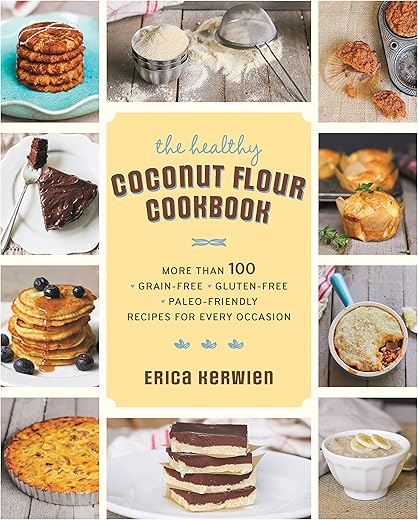More than just a cookbook—it’s a gateway to healthier baking!
Are you tired of searching for gluten-free recipes that actually taste good? Many people struggle with finding satisfying alternatives to traditional baked goods, leaving them frustrated in the kitchen.
Introducing The Healthy Coconut Flour Cookbook, your ultimate guide to grain-free baking. Packed with over 100 delicious recipes, this cookbook is designed for everyone from novices to seasoned bakers who want to indulge in guilt-free treats without compromising on flavor.
The Healthy Coconut Flour Cookbook
This cookbook is an exceptional resource for anyone looking to explore gluten-free and grain-free baking. With a variety of delicious recipes that cater to various dietary needs, it’s perfect for both novices and experienced bakers alike.
Discover the Wonders of Coconut Flour
Coconut flour has surged in popularity as a versatile and nutritious alternative to traditional flours. Known for its unique taste and texture, coconut flour is not only gluten-free but also grain-free, low in carbohydrates, and high in fiber. This makes it the ideal choice for those following paleo, gluten-free, and low-glycemic diets.
Nutritional Benefits of Coconut Flour
Unlike conventional flours, coconut flour is rich in fiber, boasting four times the fiber content of oat bran. Here are some key nutritional facts about coconut flour:
Recipe Highlights
In “The Healthy Coconut Flour Cookbook”, you will discover over 100 recipes that showcase the versatility of coconut flour. Here’s a sneak peek at some of the delightful offerings:
Author’s Expertise
Erica Kerwien, the author of this cookbook, is a renowned food blogger and recipe developer. Her blog, Comfy Belly, focuses on healthy eating and cooking. With her expertise, the book includes:
Cooking with Coconut Flour
Baking with coconut flour is different from using traditional flours. Here are some tips to ensure success:
Recipes for Every Occasion
This cookbook includes recipes suitable for any occasion, from everyday snacks to festive treats. A few highlights include:
User Reviews and Feedback
The reception of “The Healthy Coconut Flour Cookbook” has been overwhelmingly positive, with numerous reviews praising its:
Considerations
While the cookbook excels in many areas, it’s important to note some potential drawbacks:
Final Thoughts
Overall, “The Healthy Coconut Flour Cookbook” is an invaluable resource for anyone seeking to incorporate healthier baking options into their diet. Whether you are gluten-free, paleo, or simply looking for delicious alternatives, this cookbook offers a plethora of recipes that are sure to impress.
Conclusion
Embrace the delicious possibilities of coconut flour with this comprehensive cookbook. It not only welcomes you into the world of gluten-free baking but also expands your culinary horizons with innovative and healthy recipes that the entire family will love. With straightforward instructions and a focus on health, this cookbook is a must-have for your kitchen.
Try It Today!
Dive into the world of coconut flour baking and discover the joy of creating healthy, delicious treats that everyone can enjoy. Get your copy of “The Healthy Coconut Flour Cookbook” today and start your journey towards healthier baking!

FAQs
Coconut flour is a gluten-free flour derived from the dried meat of coconuts, which is ground into a fine powder. It is known for its high fiber content, which aids digestion and promotes a feeling of fullness. Additionally, it is low in carbohydrates compared to traditional flours, making it a favored choice among those following low-carb or ketogenic diets. Coconut flour is also high in protein and healthy fats, which can contribute to overall nutritional balance.
Coconut flour has unique properties that differ significantly from those of regular wheat flour. It is highly absorbent and can soak up a lot of liquid, which means recipes using it typically require adjustments. To maintain the right consistency, it is often necessary to add more eggs or additional liquids such as water or milk. A common rule of thumb is to use about 1/4 to 1/3 of the amount of coconut flour compared to regular flour, along with increased liquid and binding ingredients.
While many of the recipes can be made vegan, the majority contain eggs as a key ingredient for binding and structure. For those adhering strictly to a vegan diet, it may be necessary to substitute eggs with alternatives such as flaxseed meal, chia seeds, or commercial egg replacers. Additionally, some recipes may include dairy products, which can also be replaced with plant-based options like almond milk or coconut yogurt.
The recipes prioritize wholesome, nutritious ingredients and cater to a variety of dietary preferences. They focus on being gluten-free, grain-free, and low-glycemic, which can be beneficial for individuals with gluten sensitivities or those managing blood sugar levels. Many recipes include nutrient-dense ingredients such as vegetables, nuts, and seeds, contributing to a balanced diet. The cookbook encourages healthy eating without sacrificing flavor, making it suitable for a wide audience.
Coconut flour is readily available in many grocery stores, especially in the health food section. It’s also sold in specialty health food stores and online retailers, where a variety of brands and organic options can be found. When purchasing, it’s advisable to choose organic coconut flour when possible, as it is less likely to contain additives or preservatives, ensuring a cleaner product for baking.

Leave a Reply to Sophie Clark Cancel reply